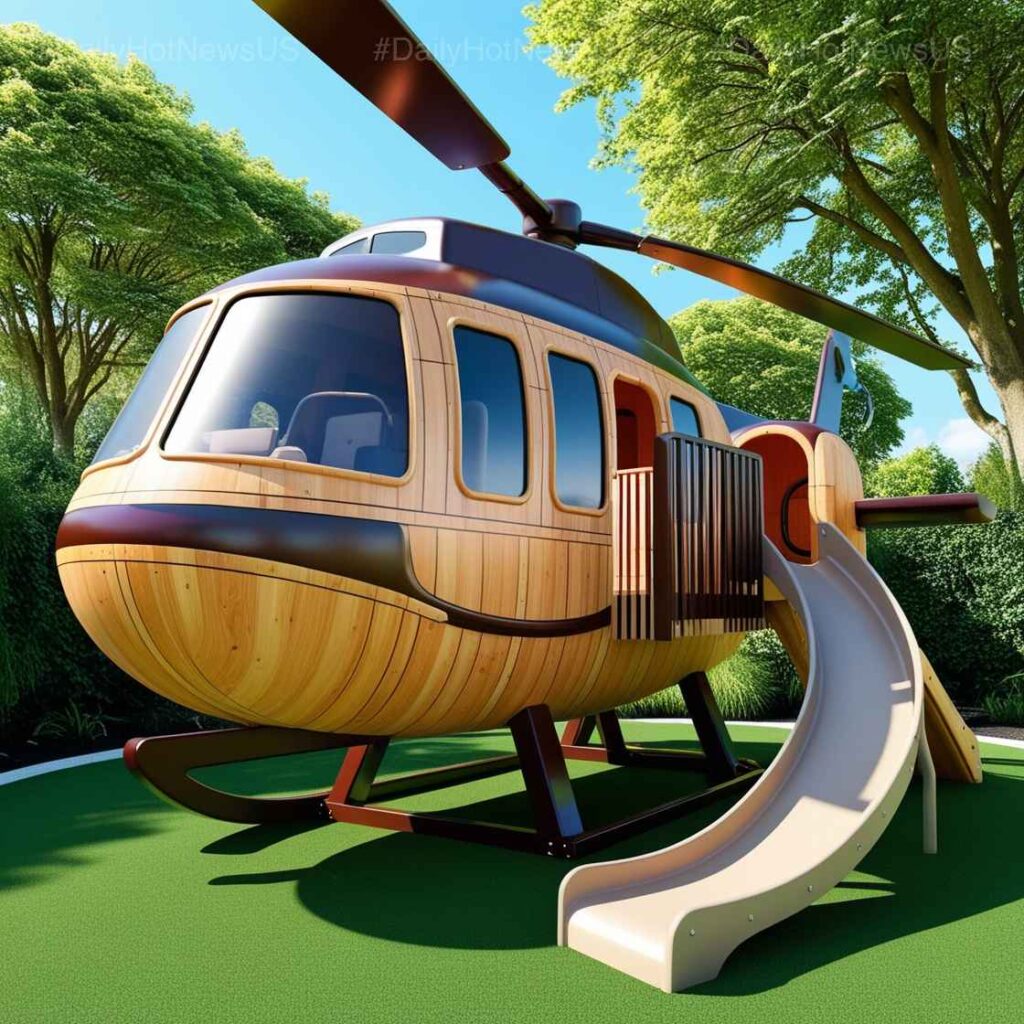Playgrounds have always been a cornerstone of childhood, serving as the backdrop for countless adventures, friendships, and developmental milestones. In an era where technology often dominates children’s attention, the importance of engaging, imaginative play spaces cannot be overstated. Enter Helicopter Playgrounds, a unique and exciting concept that combines the timeless allure of flight with the natural beauty and safety of wood construction.
Helicopter Playgrounds crafted from wood are more than just play structures; they are gateways to the skies, fueling children’s imaginations and encouraging physical activity. These playgrounds offer a thematic experience that resonates with the innate desire for exploration and adventure found in every child. This article delves deep into the world of wood helicopter playgrounds, exploring their design, benefits, and impact on child development, while highlighting why they have become a cherished addition to communities around the world.
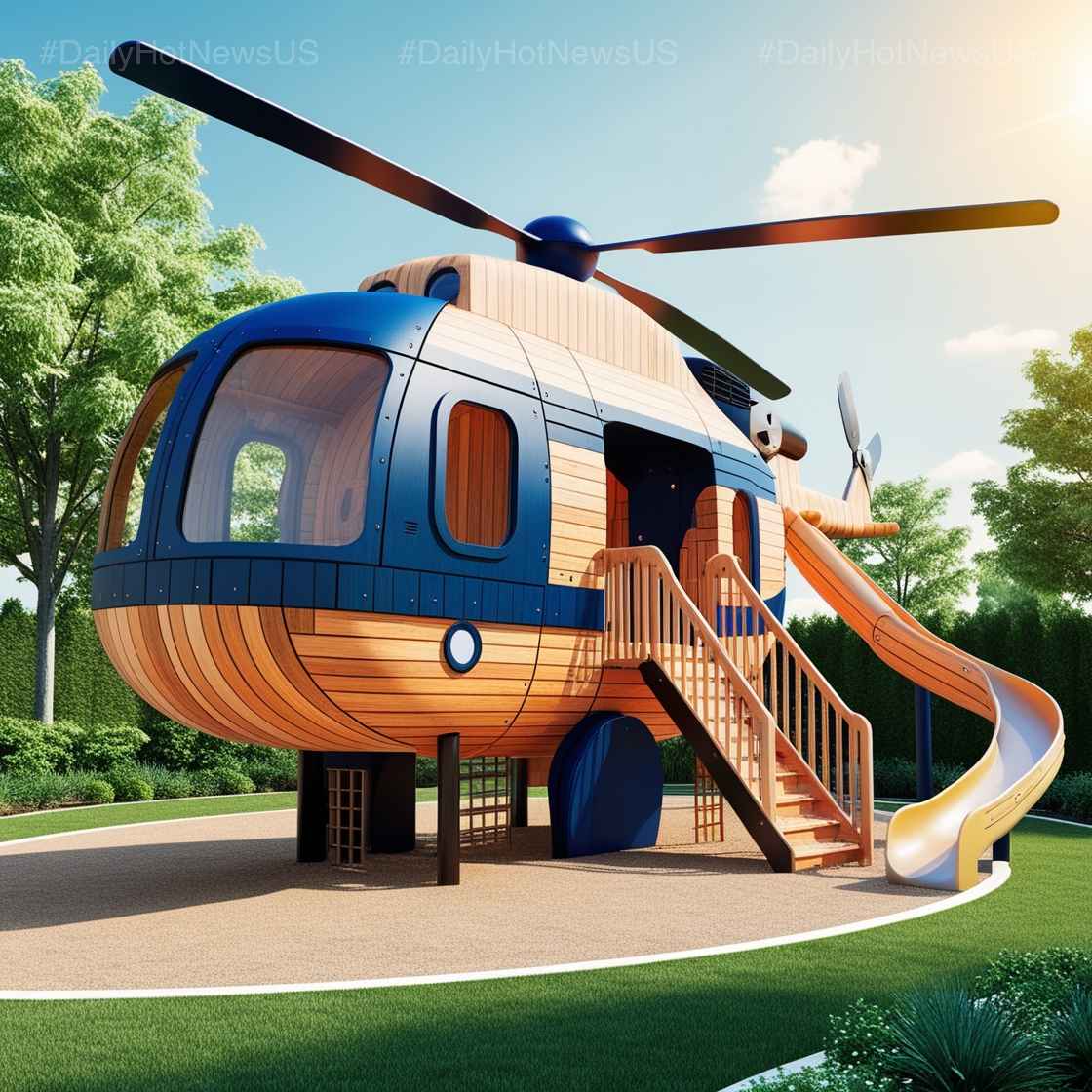
The Evolution of Playgrounds
A Brief History
The concept of playgrounds dates back to the late 19th century when the first organized play spaces were introduced in urban areas to provide children with a safe environment for physical activity. Initially, these spaces were simple, featuring basic equipment like swings and slides. Over time, playgrounds evolved to incorporate more diverse and challenging structures, recognizing the role of play in physical and cognitive development.
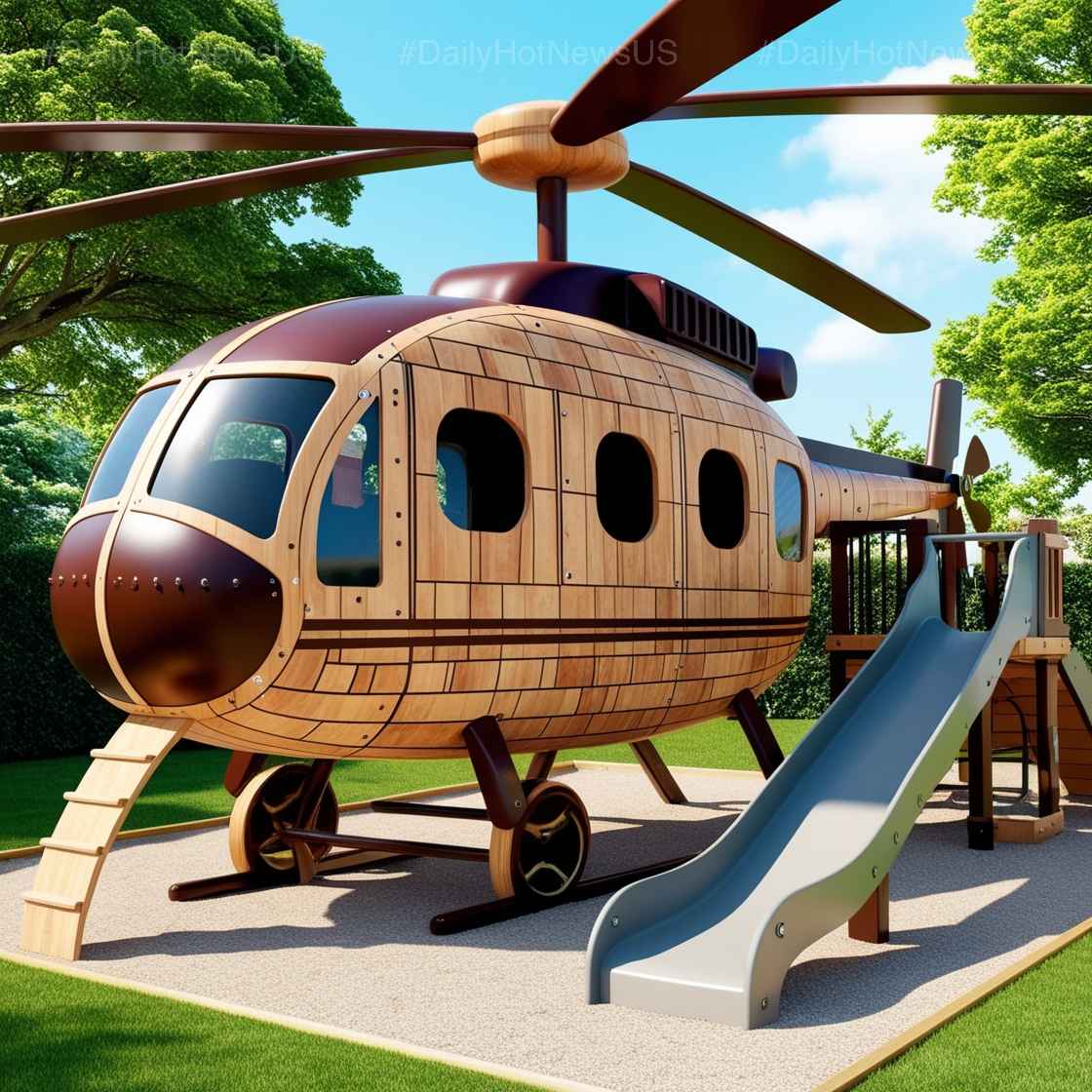
The Shift Towards Thematic Play Structures
In recent decades, there has been a significant shift towards thematic playgrounds. These designs go beyond mere physical activity, aiming to stimulate imagination and creativity. Themes like castles, ships, and helicopters transform ordinary playgrounds into fantastical worlds where children can embark on endless adventures.
The Importance of Diversity in Playground Equipment
Diverse playground equipment caters to a wide range of interests and developmental needs. By incorporating various themes and structures, playgrounds become inclusive spaces that encourage all children to participate, fostering social interaction and collaborative play.
The Allure of Helicopter Playgrounds
Why Helicopters?
Helicopters symbolize freedom, adventure, and the thrill of flight. For children, the idea of piloting a helicopter captures their imagination, allowing them to envision soaring above landscapes, embarking on rescue missions, or exploring uncharted territories.
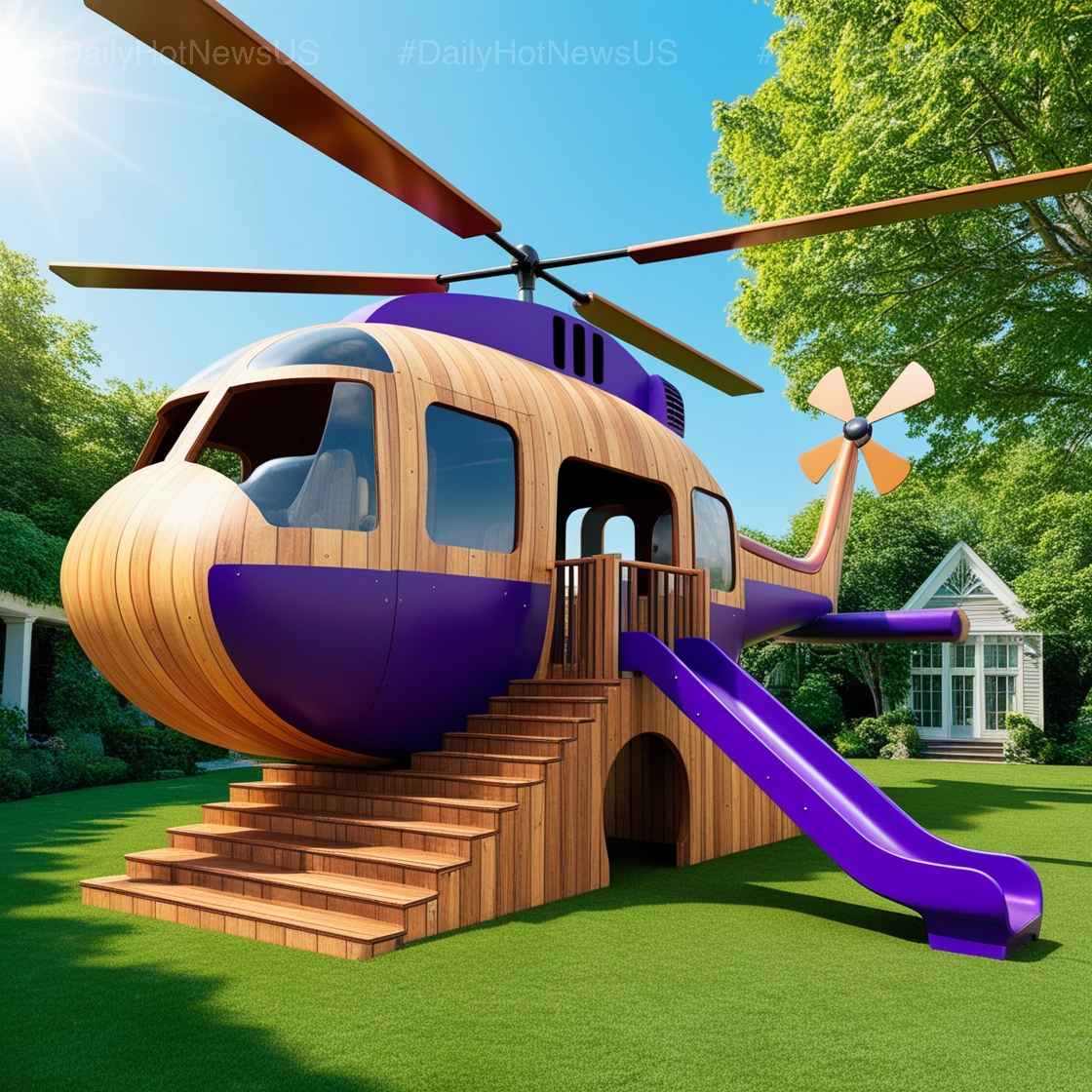
Helicopters as Symbols of Adventure and Exploration
Incorporating Helicopter Playgrounds into community spaces taps into children’s natural curiosity and desire for exploration. These playgrounds serve as physical manifestations of their dreams of flight and adventure, providing a tangible platform for imaginative play.
The Appeal to Children’s Imagination
The unique structure of a helicopter playground invites role-playing and storytelling. Children can take on various roles—pilots, co-pilots, rescue workers—creating dynamic narratives that enhance their creative thinking and social skills.
Wood as the Preferred Material
Benefits of Wood in Playground Construction
Wood is a timeless material that offers numerous benefits for playground construction. Its natural appearance blends seamlessly with outdoor environments, creating aesthetically pleasing play areas. Wood is also durable and can withstand various weather conditions when properly treated.
Safety Aspects
Safety is paramount in playground design. Wood provides a sturdy and stable structure, and when crafted with care, it minimizes the risk of injuries. The natural flexibility of wood can absorb impact better than some synthetic materials, reducing the severity of falls.
Environmental Considerations
Using wood from sustainable sources makes wood helicopter playgrounds an environmentally friendly choice. Wood is biodegradable and has a lower carbon footprint compared to plastics and metals, aligning with growing environmental consciousness.
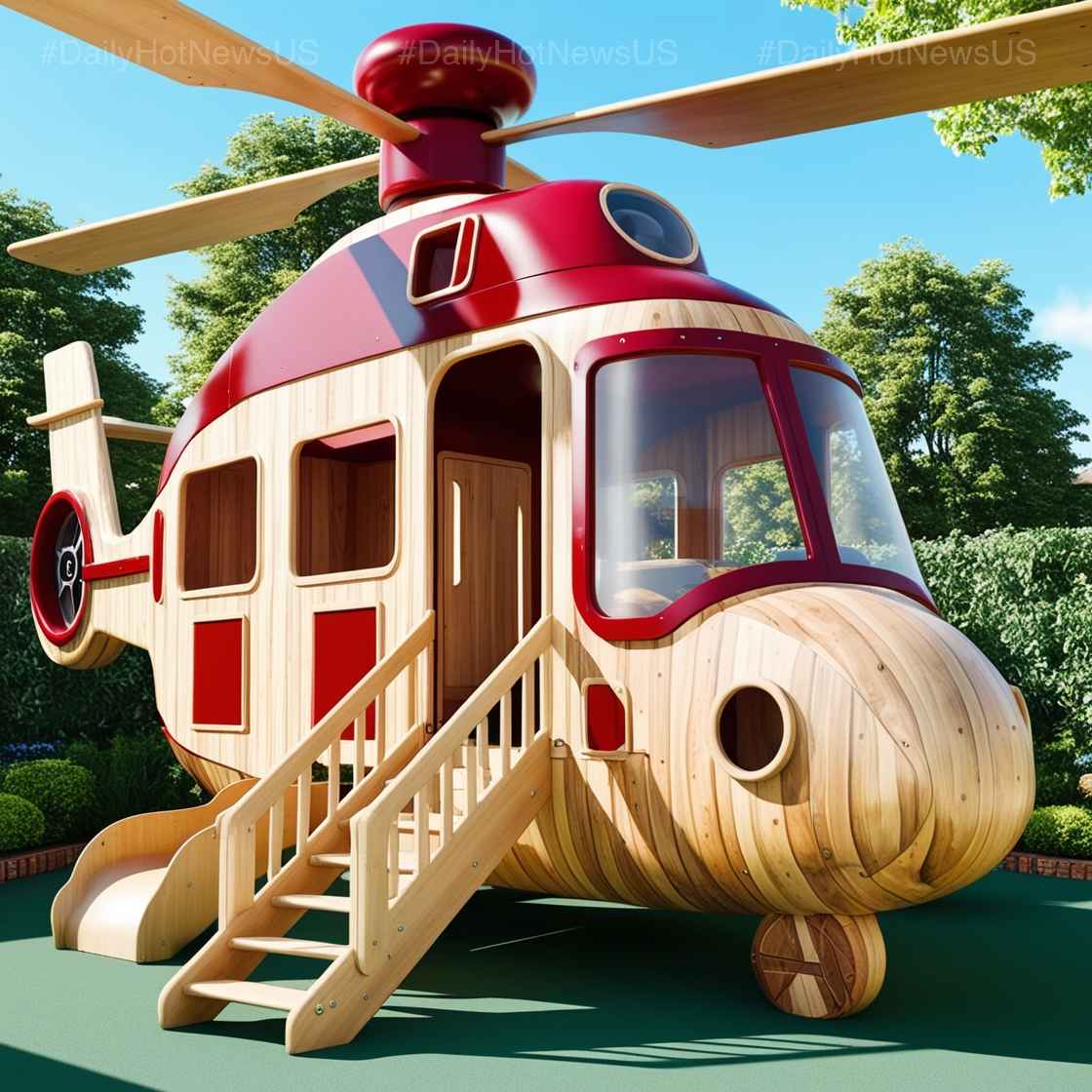
Aesthetics and Blending with Nature
Wooden playgrounds complement natural settings, enhancing the beauty of parks and community spaces. The organic look and feel of wood create a warm and inviting atmosphere that encourages children to engage with nature.
Features of Wood Helicopter Playgrounds
Design Elements
Helicopter Playgrounds made of wood often feature realistic designs, including rotor blades, cockpits, and tail sections. These elements are carefully crafted to be safe for play while providing an authentic helicopter experience.
Interactive Features
Interactive components such as control panels, levers, and communication devices enhance the play experience. These features allow children to engage in more complex play scenarios, promoting cognitive development and problem-solving skills.
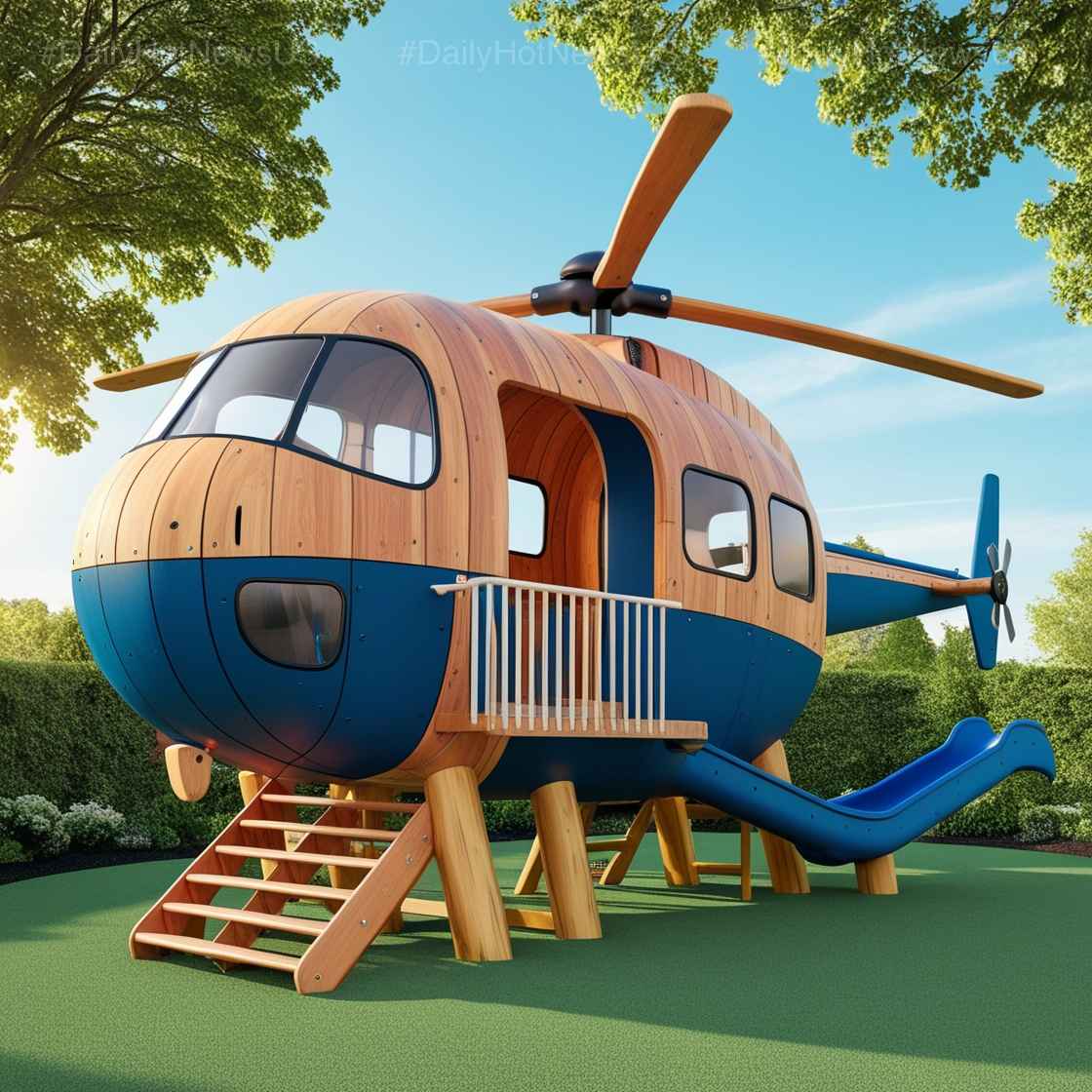
Safety Features
Safety rails, non-slip surfaces, and rounded edges are integral parts of the design. The height of platforms is regulated to prevent dangerous falls, and soft ground materials like mulch or rubber padding are used to cushion impacts.
Accessibility Considerations
Inclusive design ensures that children of all abilities can enjoy the playground. Ramps, wide entrances, and sensory play elements make helicopter playgrounds accessible, promoting social inclusion and equal play opportunities.
Impact on Child Development
Physical Benefits
Climbing, sliding, and balancing activities in helicopter playgrounds enhance motor skills, strength, and coordination. The physical challenges presented by the playground encourage children to test their limits in a safe environment.
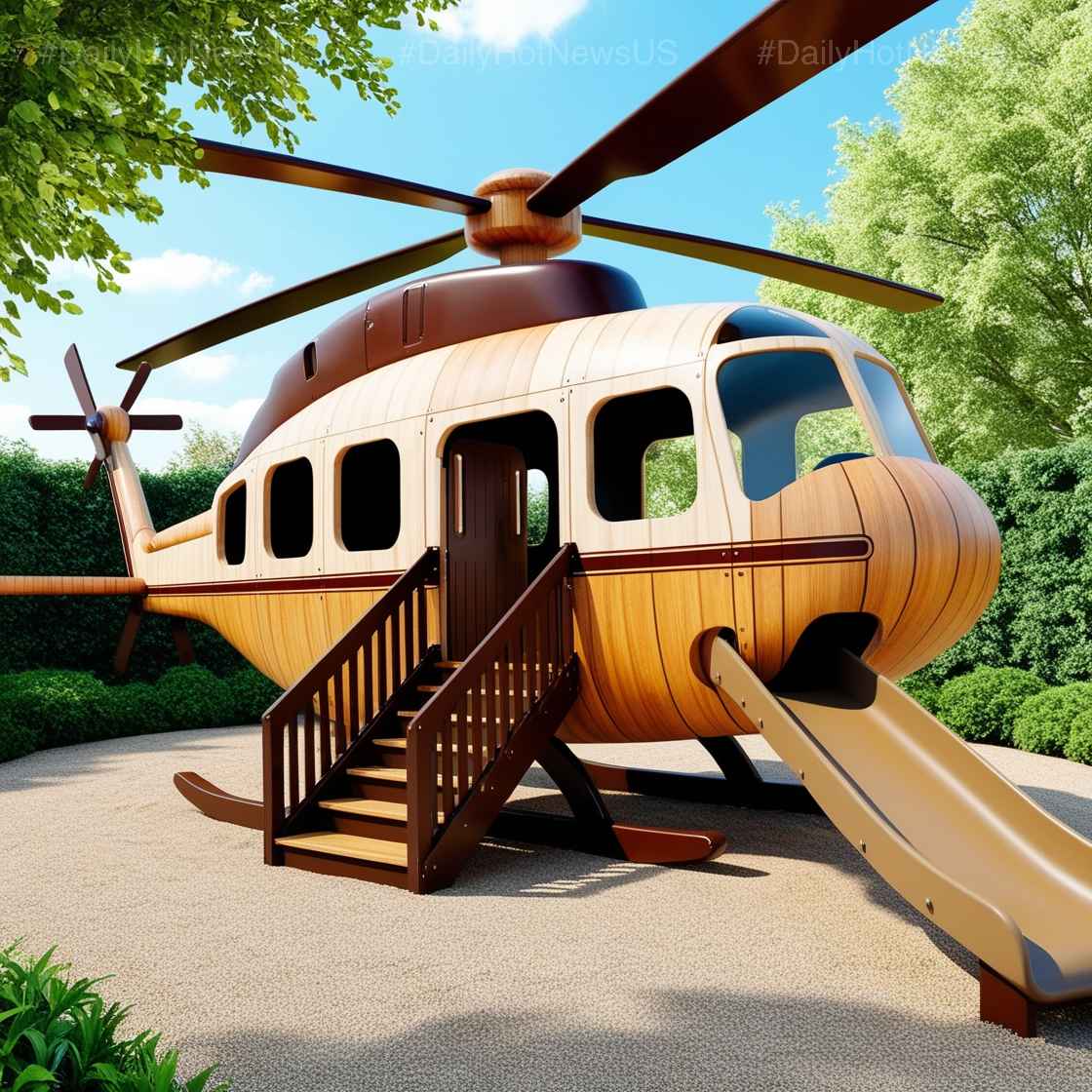
Cognitive Benefits
Navigating the playground and engaging with interactive features stimulate cognitive development. Children practice decision-making, spatial awareness, and problem-solving as they explore different aspects of the helicopter structure.
Social Benefits
Playgrounds are social hubs where children learn to interact, share, and collaborate. Role-playing in helicopter playgrounds fosters teamwork and communication as children take on different roles and work together in their imaginative adventures.
Encouraging Imaginative Play
Imaginative play is crucial for creativity and emotional development. Helicopter playgrounds provide a rich backdrop for storytelling and fantasy, allowing children to express themselves and explore different scenarios.
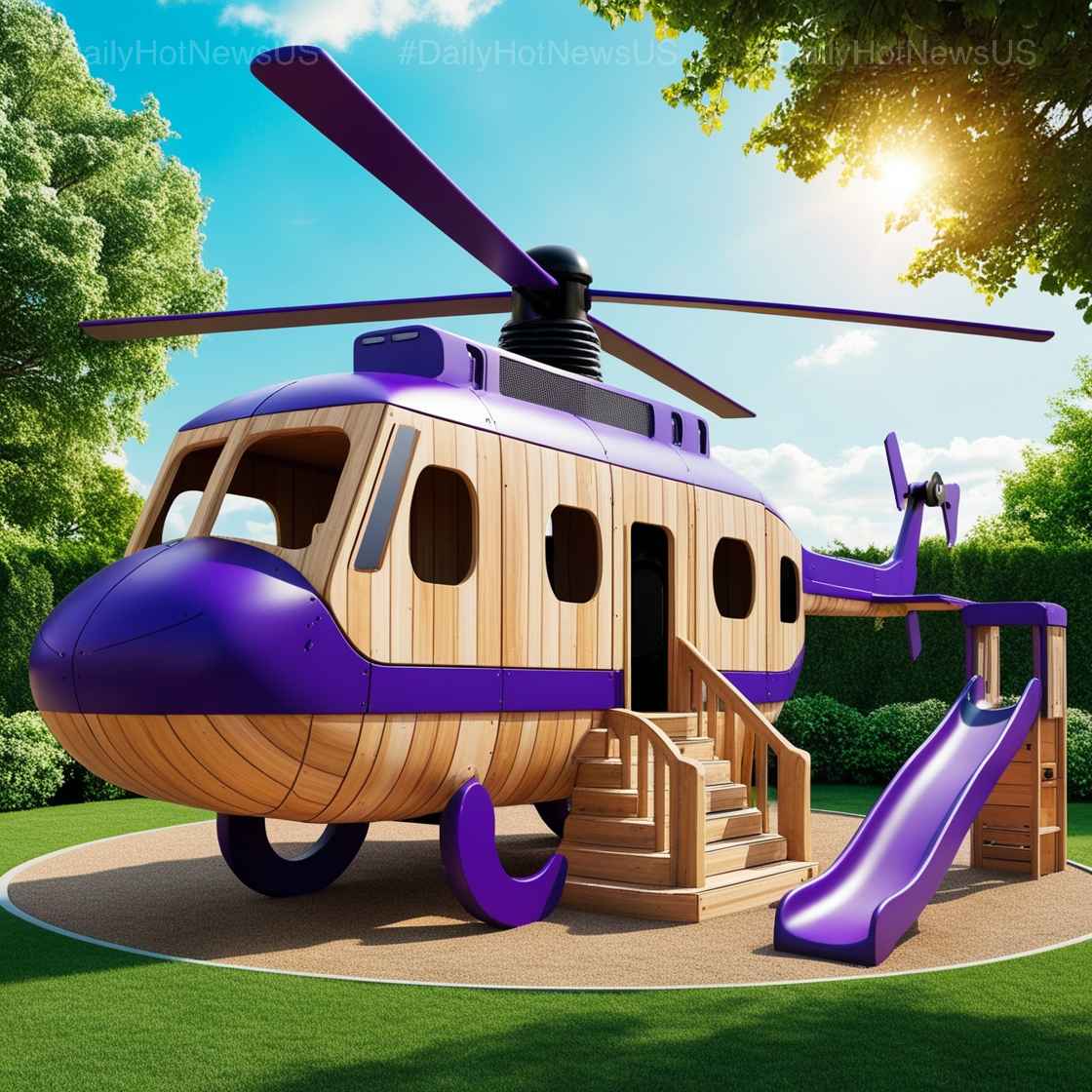
Case Studies
Example 1: Skyward Park’s Helicopter Playground
Skyward Park introduced a wooden helicopter playground that quickly became the centerpiece of the community. Featuring a large helicopter structure with multiple entry points, slides, and interactive panels, it attracted children from all over the city. Parents praised the playground for its safety features and ability to engage children of various ages.
Links to purchase similar products: Click here
Example 2: Greenfield Community’s Eco-Friendly Playground
Greenfield Community focused on sustainability by constructing a wood helicopter playground using recycled wood. The playground included educational panels about the environment and renewable energy, integrating learning with play. The initiative received positive feedback for promoting environmental awareness among children.
Impact on Local Communities
These case studies highlight how helicopter playgrounds can revitalize community spaces, encourage outdoor activity, and strengthen community bonds. They serve as gathering places where families connect, and children form lasting friendships.
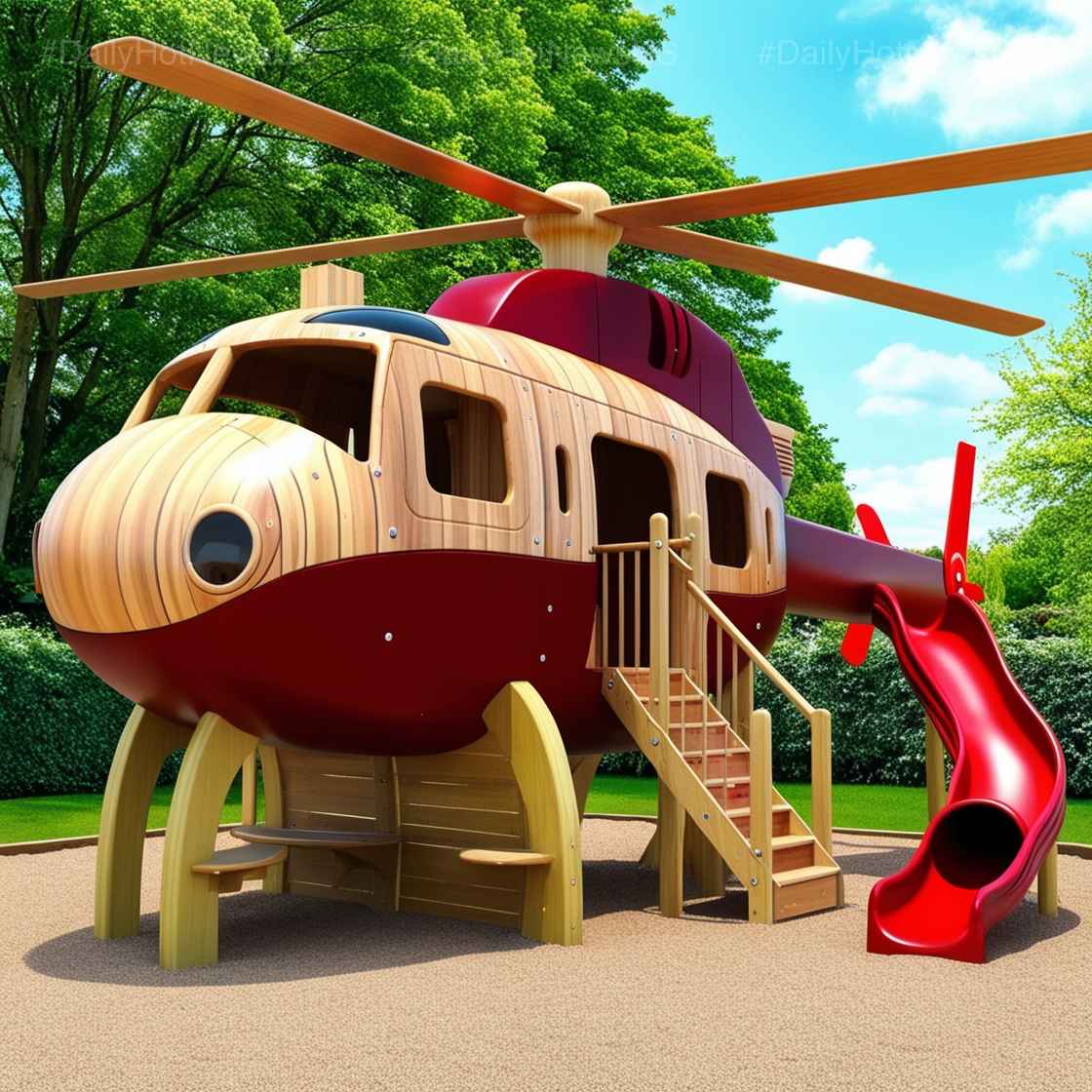
Considerations for Installation
Site Selection
Choosing the right location is crucial. The site should be accessible, safe, and spacious enough to accommodate the playground and allow for future expansion. Proximity to amenities like restrooms and seating areas enhances the usability of the space.
Safety Standards and Regulations
Compliance with local safety standards and regulations ensures that the playground is safe for public use. This includes adhering to guidelines on equipment height, surfacing materials, and spacing between structures.
Maintenance Requirements
Regular maintenance keeps the playground safe and appealing. Wood structures require periodic inspections for wear and tear, treatment against pests, and weatherproofing to extend their lifespan.
Cost Considerations
Budgeting for a wood helicopter playground involves initial construction costs and ongoing maintenance expenses. However, the investment yields significant returns in community engagement and children’s well-being.
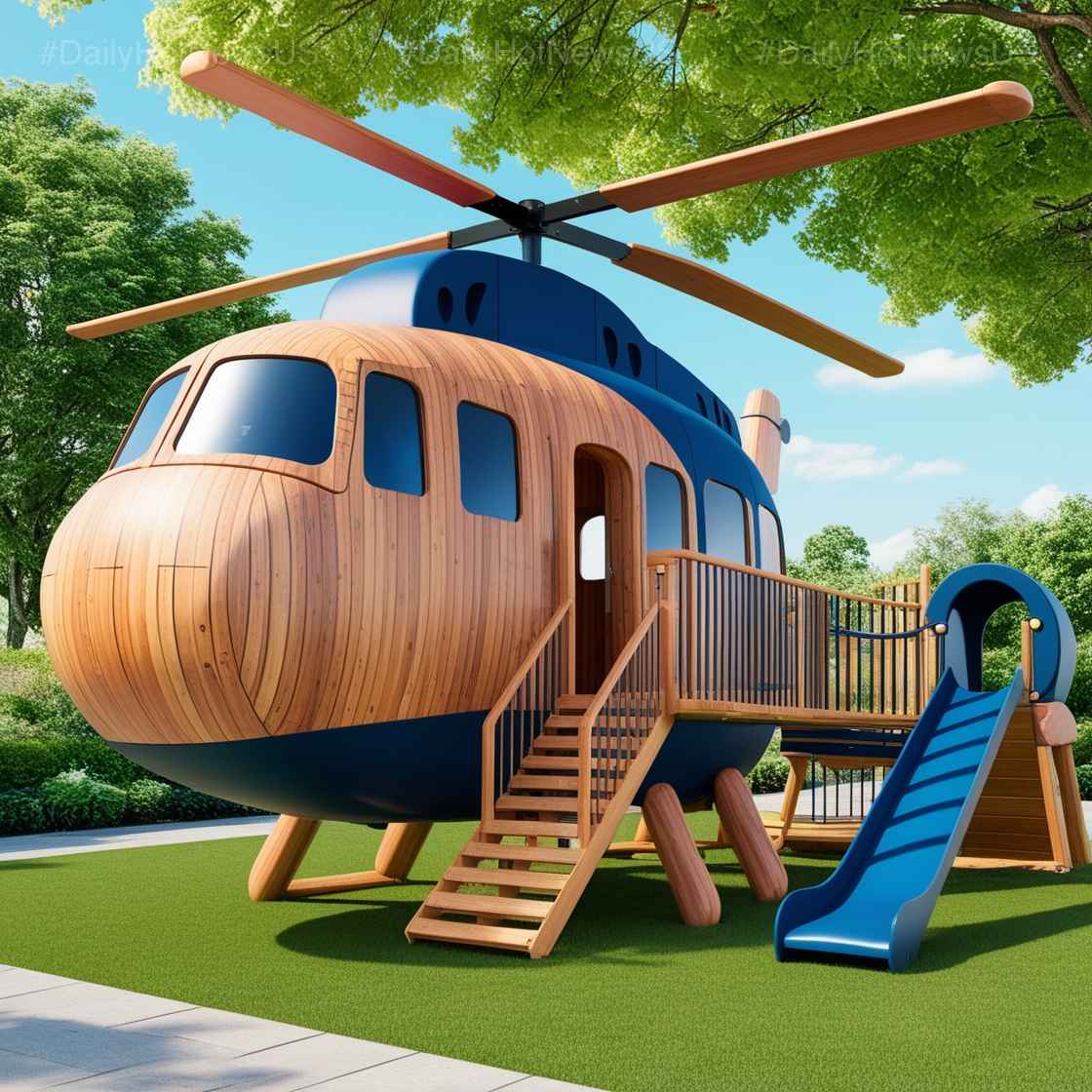
The Future of Helicopter Playgrounds
Trends in Playground Design
The future of playgrounds lies in innovative designs that combine traditional play with modern technology. Interactive elements, customization, and thematic diversity are becoming increasingly popular.
Integration of Technology
Some playgrounds are incorporating technology, such as augmented reality, to enhance the play experience. For helicopter playgrounds, this could mean interactive apps that simulate flight or educational programs about aviation.
Sustainability Aspects
Sustainable materials and eco-friendly designs are at the forefront of new playground projects. Using reclaimed wood, incorporating solar panels, or adding green spaces are ways to make playgrounds more environmentally responsible.
Community Engagement and the Role of Helicopter Playgrounds
Building Stronger Communities
Helicopter Playgrounds have a unique way of bringing communities together. They serve as focal points where families gather, fostering a sense of belonging and community spirit. These playgrounds become venues for community events, children’s parties, and educational programs, enhancing social cohesion.
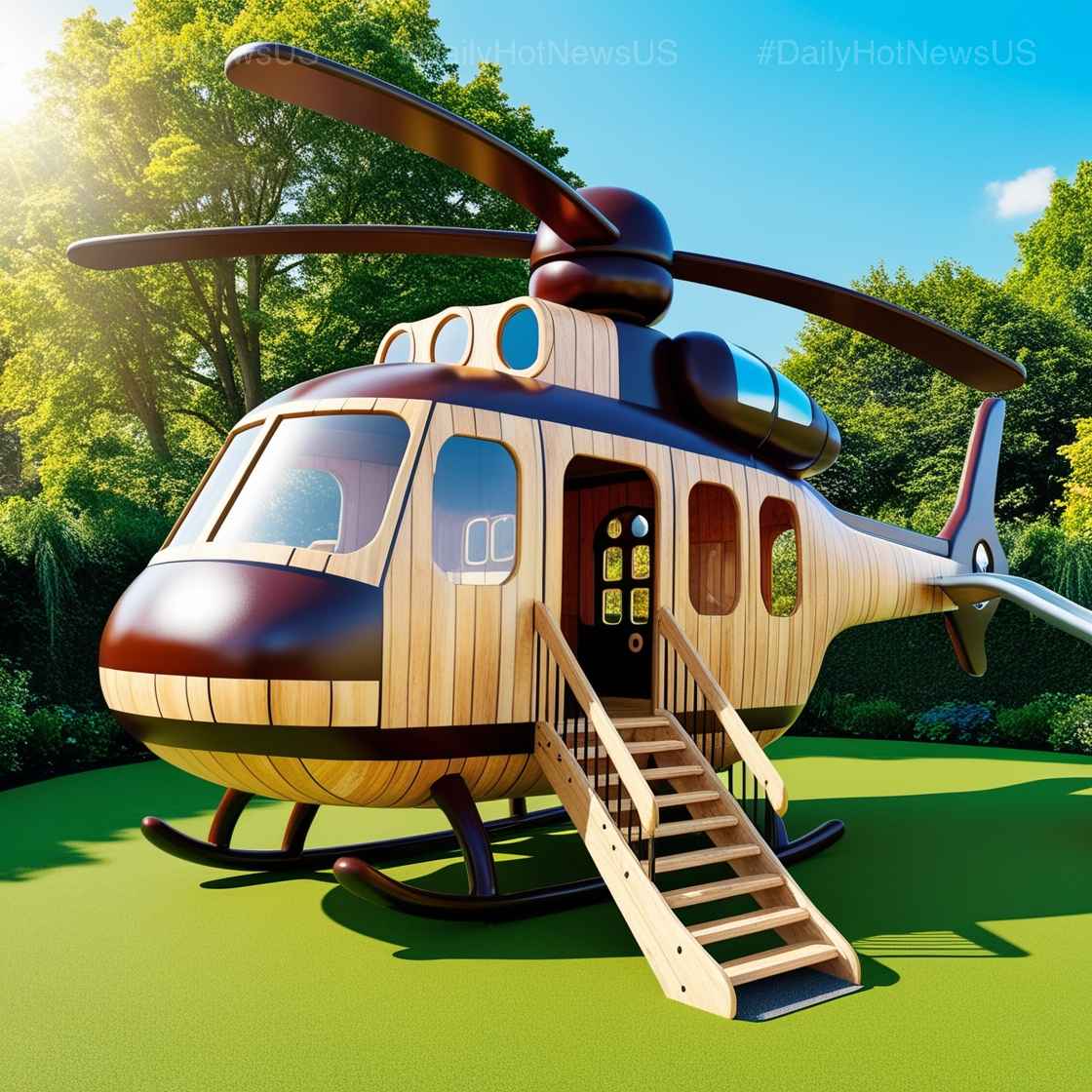
Encouraging Parental Involvement
Parents play a crucial role in children’s play experiences. The thematic nature of helicopter playgrounds often excites parents as much as children, encouraging them to participate in play, supervise actively, and engage with other parents. This involvement strengthens parent-child relationships and builds a supportive community network.
Volunteer Opportunities and Local Ownership
The construction and maintenance of wood helicopter playgrounds often involve community volunteers. This participatory approach instills a sense of ownership and pride among residents. Community-led initiatives can include fundraising, design input, and hands-on building efforts, making the playground a true community asset.
Educational Opportunities
Learning Through Play
Helicopter Playgrounds are not just about fun; they are educational tools that promote learning in an engaging way. Thematic play encourages children to learn about aviation, physics, and geography. Informational plaques and interactive displays can be incorporated to provide educational content about how helicopters work or historical facts about aviation.
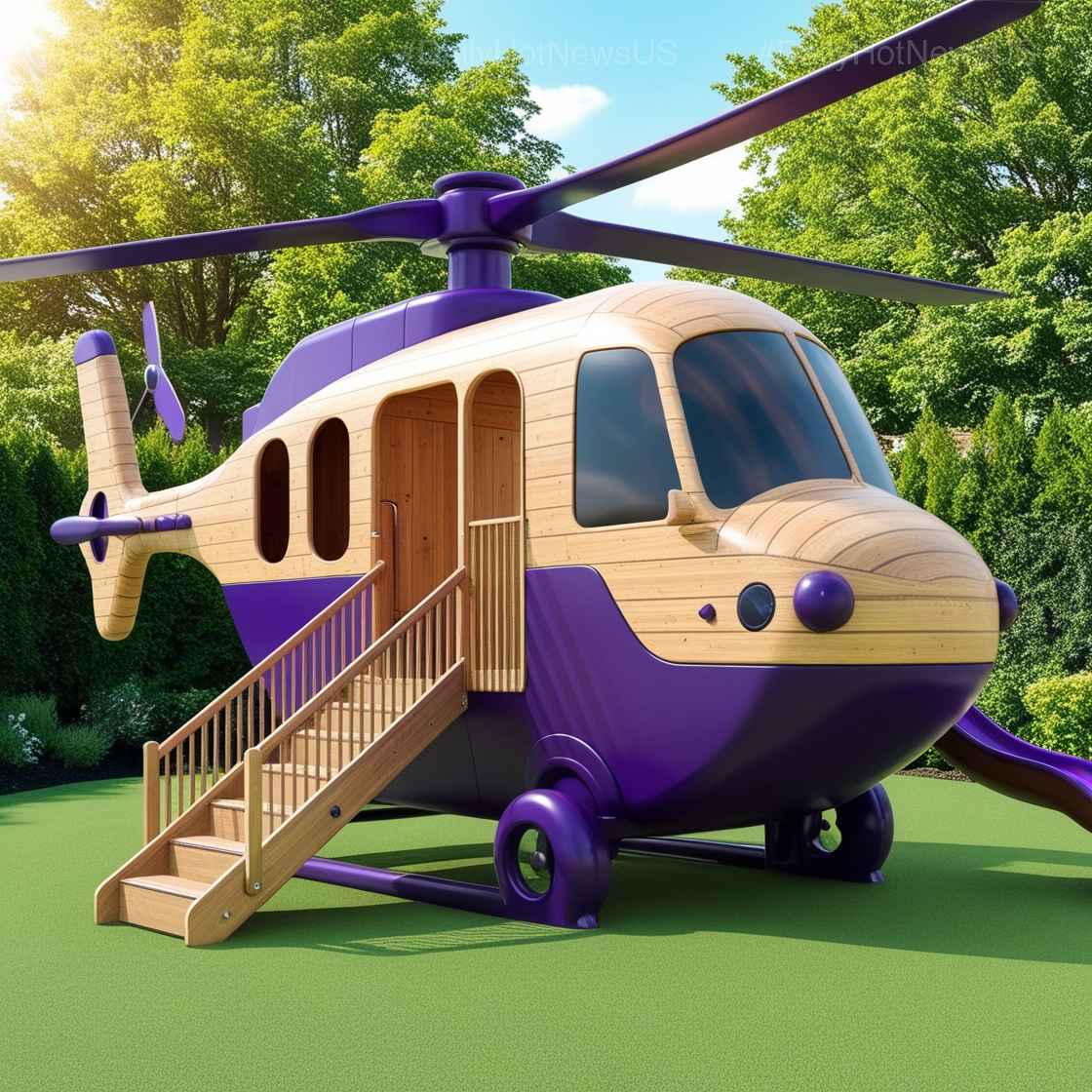
STEM Education Integration
Integrating Science, Technology, Engineering, and Mathematics (STEM) concepts into playgrounds is a growing trend. Helicopter playgrounds can feature elements that teach principles like lift, thrust, and aerodynamics in a hands-on manner. This early exposure to STEM concepts can spark lifelong interests and academic pursuits in these fields.
Environmental Education
Using wood and sustainable materials in playground construction provides an opportunity to educate children about environmental stewardship. Informational signs about the importance of using renewable resources and preserving natural habitats can be part of the playground’s educational aspect.
Addressing Challenges in Implementation
Safety Concerns
While wood helicopter playgrounds offer numerous benefits, safety remains a top concern. Ensuring that the playground meets all safety standards requires careful planning and professional construction. Regular inspections and maintenance are necessary to address wear and tear that could pose safety risks.
Budget Constraints
Funding can be a significant hurdle for communities looking to install a helicopter playground. Grants, community fundraising events, and partnerships with local businesses can help offset costs. Some communities have successfully launched crowdfunding campaigns to support their playground projects.
Vandalism and Security
Protecting the playground from vandalism is essential to maintain its appeal and safety. Installing proper lighting, security cameras, and involving the community in surveillance can deter potential vandalism. Educational programs that instill respect for community property among youths can also be beneficial.
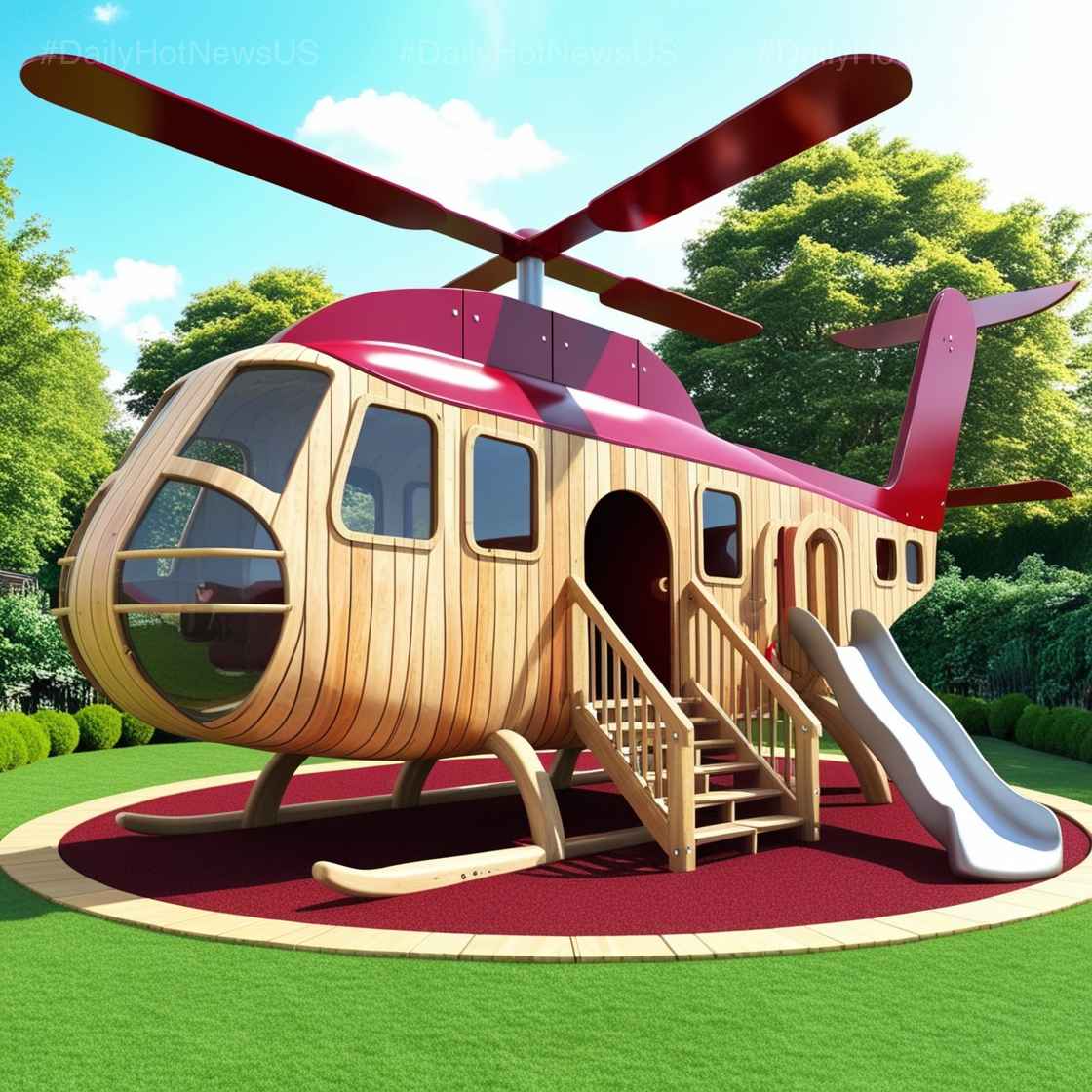
Success Stories Around the World
The Aviator’s Dream Playground in London
In London, a community transformed an unused park area into “The Aviator’s Dream,” a wood helicopter playground that has become a landmark attraction. With input from local schools and aviation enthusiasts, the playground features a large wooden helicopter with interactive elements. The project boosted local tourism and provided educational programs in collaboration with nearby museums.
Links to purchase similar products: Click here
Sky High Adventure in Sydney
Sydney’s “Sky High Adventure” playground incorporates multiple aviation-themed structures, with the helicopter playground being the centerpiece. The playground has been praised for its inclusive design, catering to children with disabilities through accessible equipment and sensory play areas. It has received awards for innovation in playground design.
Community Revitalization in Detroit
In Detroit, a grassroots initiative led to the creation of a wood helicopter playground in a neighborhood undergoing revitalization. The project not only provided a safe play area for children but also spurred economic development. Local businesses saw increased patronage, and property values in the area improved.
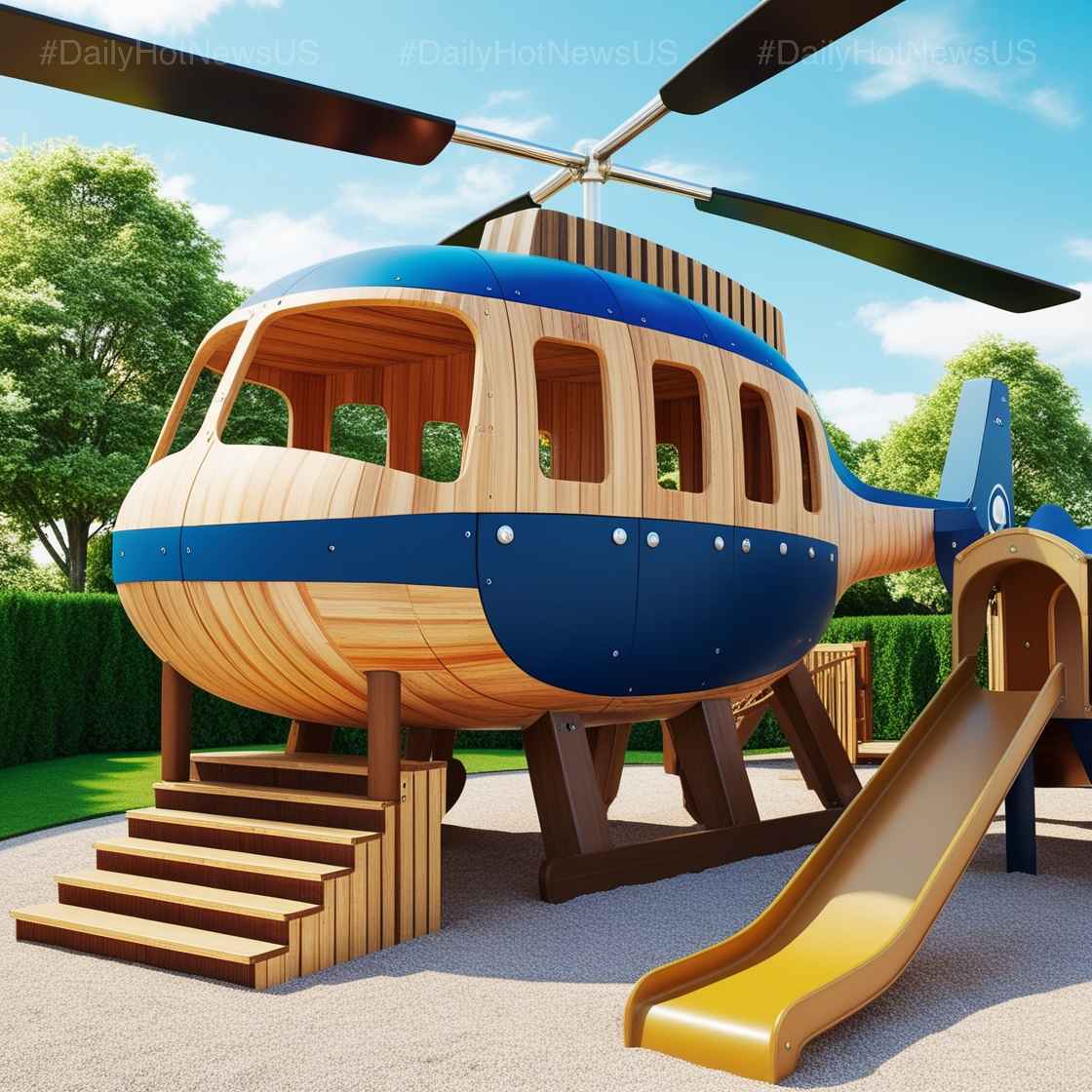
Designing Your Own Wood Helicopter Playground
Customization and Personalization
Communities and organizations interested in building a helicopter playground can customize designs to reflect local culture, history, or values. Incorporating community symbols, colors, or themes can make the playground unique and foster a stronger connection with residents.
Involving Children in the Design Process
Involving children in the design phase can lead to more engaging and appreciated play spaces. Children’s input can provide insights into what features are most appealing and ensure the playground meets their needs and desires.
Partnering with Professionals
Working with experienced playground designers and builders is crucial. Professionals can navigate safety regulations, optimize the use of space, and ensure that the playground is both fun and functional. They can also provide guidance on materials, sustainability practices, and long-term maintenance planning.
The Psychological Impact on Children
Building Confidence and Independence
Playing in helicopter playgrounds allows children to take on challenges and overcome obstacles, building confidence and a sense of achievement. The complexity and novelty of the equipment encourage children to explore independently, fostering autonomy.
Stress Relief and Emotional Well-being
Outdoor play in stimulating environments reduces stress and promotes emotional well-being. The imaginative aspects of helicopter playgrounds provide an escape from daily routines and pressures, allowing children to express emotions and process experiences through play.
Enhancing Concentration and Academic Performance
Studies have shown that regular physical activity and imaginative play improve concentration and academic performance. By engaging in active play at helicopter playgrounds, children return to educational settings more focused and ready to learn.
The Role of Playgrounds in Urban Planning
Enhancing Urban Environments
Incorporating wood helicopter playgrounds into urban planning enhances the livability of cities. They provide much-needed green spaces and recreational areas that improve the quality of life for residents. Such playgrounds can also serve as tourist attractions, boosting the local economy.
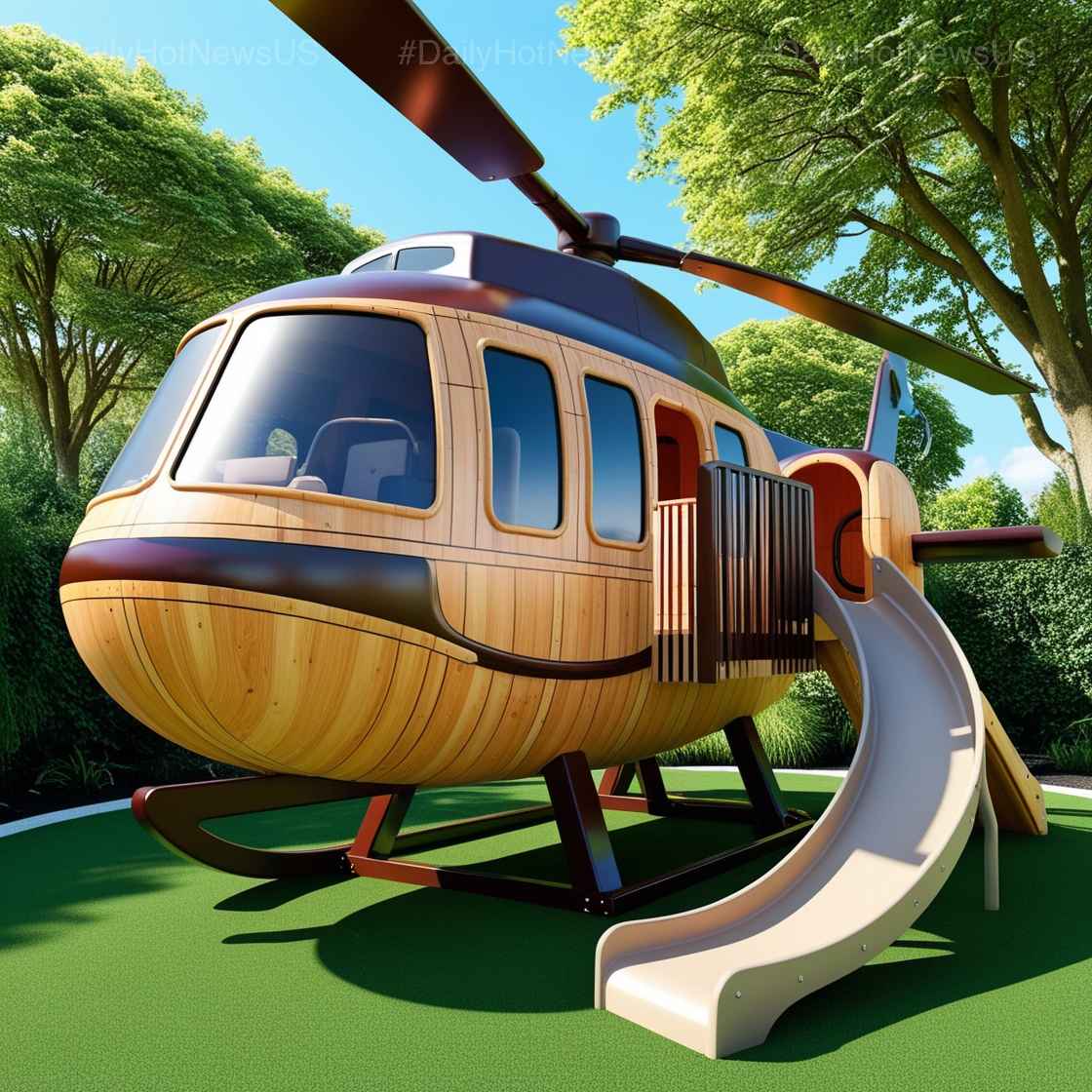
Promoting Sustainable Cities
Using sustainable materials like wood in playground construction aligns with broader goals of creating environmentally friendly urban spaces. These practices contribute to reducing the carbon footprint of cities and promote sustainability.
Addressing Urban Challenges
Playgrounds can help address urban challenges such as obesity, social isolation, and lack of community engagement. Helicopter playgrounds offer attractive solutions by promoting physical activity, providing social spaces, and engaging residents in communal activities.
Testimonials and Expert Opinions
Parents’ Perspectives
“My children absolutely love the helicopter playground in our neighborhood. It’s not just a playground; it’s a place where their imaginations take flight. They’ve become more active and made many new friends,” says Maria, a mother of two.
Educators’ Views
“Integrating play with learning is essential, and the wood helicopter playground provides an excellent platform for that. We’ve noticed improved social skills and teamwork among students who regularly play there,” remarks Mr. Thompson, a local school teacher.
Health Professionals’ Insights
“Physical activity is crucial for healthy development. Playgrounds like the helicopter playground encourage children to be active in a fun and engaging way, which is key to establishing lifelong healthy habits,” states Dr. Lee, a pediatrician.
How to Get Involved in Building a Wood Helicopter Playground
Steps for Community Members
If you’re inspired by the concept of Helicopter Playgrounds and wish to bring one to your community, there are several steps you can take:
- Gather Community Support: Start by discussing the idea with neighbors, local parents, and community leaders to gauge interest and gather support.
- Form a Planning Committee: Organize a group of dedicated individuals who can contribute time and skills to the project.
- Develop a Proposal: Create a detailed proposal outlining the benefits, costs, and potential locations for the playground.
- Secure Funding: Explore funding options such as grants, fundraising events, sponsorships from local businesses, or crowdfunding campaigns.
- Partner with Professionals: Engage with playground designers, architects, and builders who have experience in constructing wood helicopter playgrounds.
- Obtain Necessary Approvals: Work with local authorities to secure permits and ensure compliance with regulations.
- Promote Sustainability: Consider using sustainable materials and practices to minimize environmental impact.
- Plan for Maintenance: Establish a maintenance plan and budget to ensure the playground remains safe and appealing over time.
Engaging Local Schools and Organizations
Collaborating with schools, youth organizations, and environmental groups can enhance the project’s success. These partnerships can provide additional resources, expertise, and outreach opportunities.
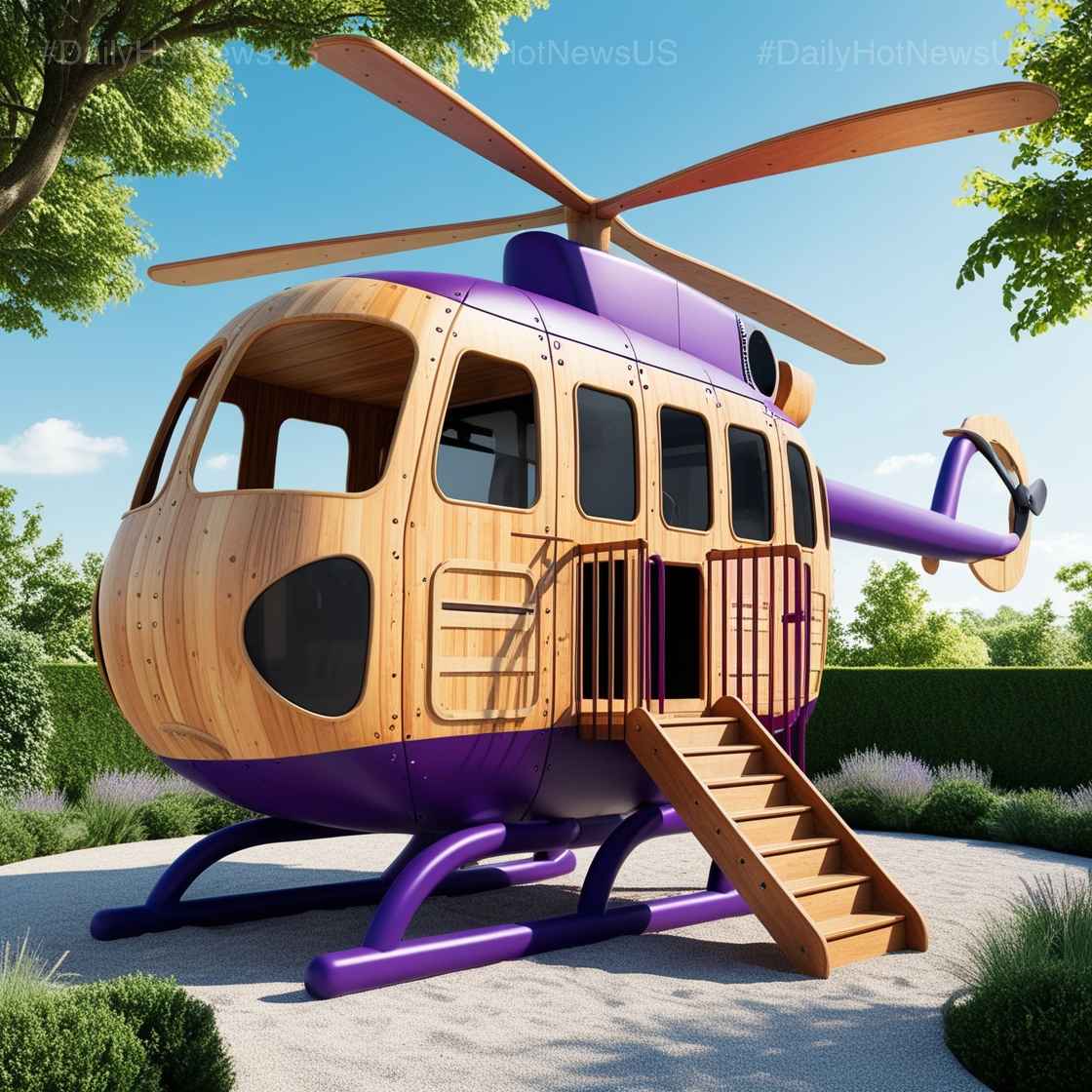
The Role of Policy Makers and Government Support
Importance of Government Involvement
Government agencies play a crucial role in the development and maintenance of public playgrounds. Their support can come in the form of funding, policy development, and providing public land for playground construction.
Advocacy and Policy Development
Advocating for policies that promote the installation of wood helicopter playgrounds can lead to broader adoption. Policies might include incentives for sustainable construction, grants for community projects, or regulations that ensure playgrounds are inclusive and accessible.
Case for Investment
Investing in helicopter playgrounds yields long-term benefits, including improved public health, stronger communities, and enhanced urban environments. Presenting these benefits to policy makers can help secure necessary support and resources.
Future Innovations in Helicopter Playgrounds
Incorporating Technology
The integration of technology into playgrounds is an exciting frontier. Possibilities include:
- Interactive Sound and Light Features: Adding elements that respond to touch or movement can enhance sensory experiences.
- Educational Apps and Augmented Reality: Developing apps that interact with the playground can provide educational content about aviation, physics, or environmental science.
- Smart Playgrounds: Utilizing sensors and connectivity to monitor usage patterns, maintenance needs, and safety alerts.
Sustainable Advancements
Advancements in sustainable materials and construction techniques can further reduce the environmental impact of playgrounds. Innovations might include:
- Recycled and Composite Materials: Using materials made from recycled plastics and woods to build durable structures.
- Energy Generation: Incorporating solar panels or kinetic energy features that power lights or interactive components.
Customizable and Modular Designs
Future helicopter playgrounds may feature modular components that can be reconfigured or expanded over time, allowing for ongoing evolution and adaptation to community needs.
Frequently Asked Questions
What age groups are Helicopter Playgrounds suitable for?
Helicopter Playgrounds are typically designed to cater to a wide range of ages, from toddlers to pre-teens. Features can be scaled appropriately, with lower platforms and simpler interactive elements for younger children, and more challenging components for older kids.
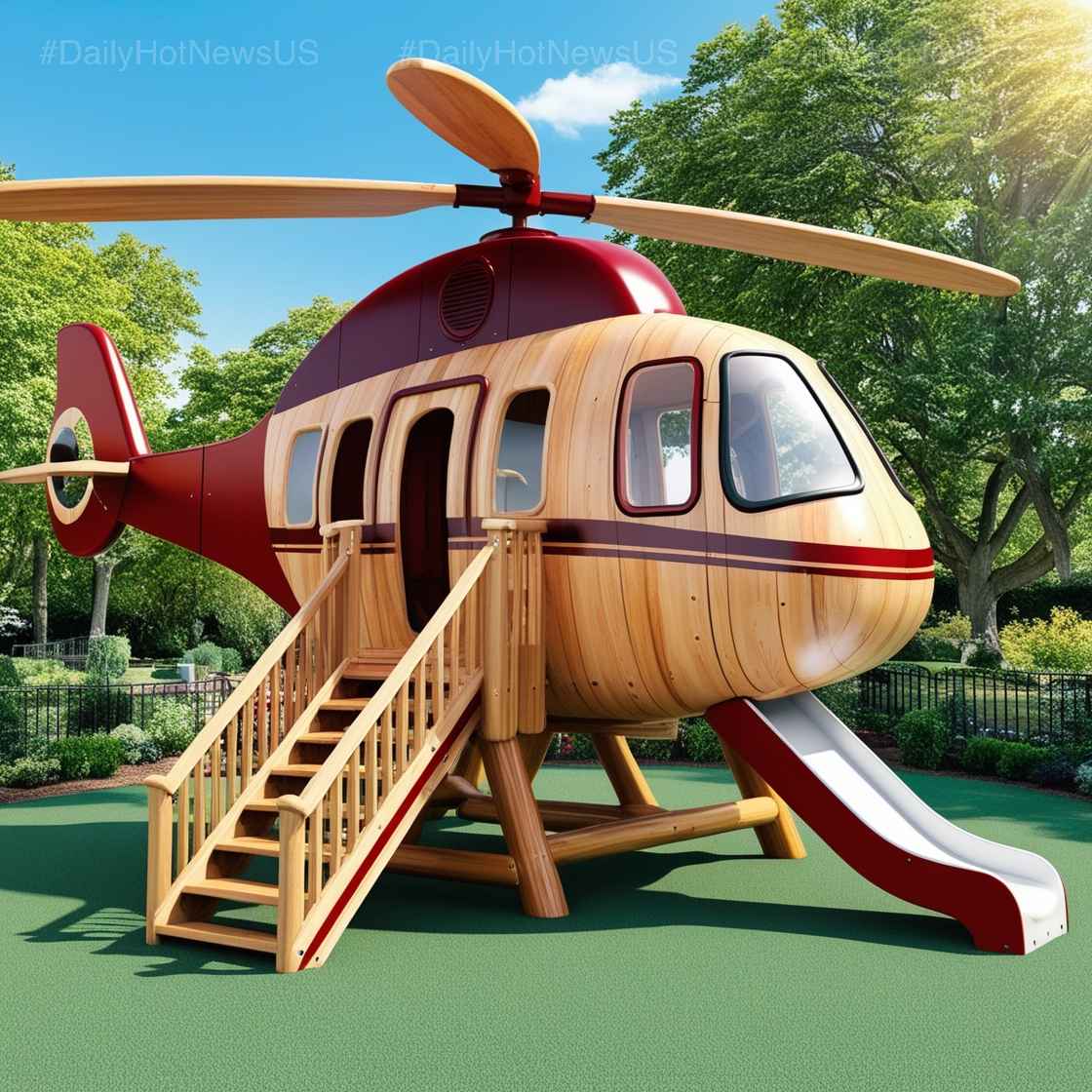
How much does it cost to build a wood helicopter playground?
Costs vary widely depending on size, design complexity, materials, and location. A small community playground might start around $50,000, while larger, more elaborate projects can exceed $200,000. Fundraising and grants can significantly offset these costs.
Are wood playgrounds safe and durable?
Yes, when constructed with high-quality materials and proper treatment, wood playgrounds are safe and durable. Regular maintenance is essential to address weathering and wear, ensuring longevity and safety over time.
How do helicopter playgrounds promote learning?
These playgrounds encourage imaginative play, role-playing, and physical activity, all of which contribute to cognitive and social development. Interactive features can incorporate educational elements related to aviation, science, and the environment.
Links to purchase similar products: Click here
Can helicopter playgrounds be made accessible for children with disabilities?
Absolutely. Inclusive design principles can be applied to ensure accessibility. This includes ramps, transfer stations, sensory play elements, and equipment designed for various abilities, allowing all children to participate and enjoy the playground.
———–
Wood Helicopter Playgrounds represent the perfect fusion of imagination, adventure, and environmental consciousness. They provide children with a dynamic play environment that supports physical, cognitive, and social development. By investing in such playgrounds, communities create vibrant spaces that encourage outdoor activity, foster social connections, and nurture the next generation’s creativity and curiosity.
The enduring appeal of helicopter playgrounds lies in their ability to capture the wonder of flight and the joy of play. As we look to the future, these playgrounds will continue to evolve, incorporating new technologies and sustainable practices, but their core purpose remains the same: to provide a safe and inspiring place for children to explore, learn, and grow.
DailyHotNewsUS is committed to bringing you in-depth articles on topics that shape our communities and impact our daily lives. Stay tuned for more insights and stories that matter.
